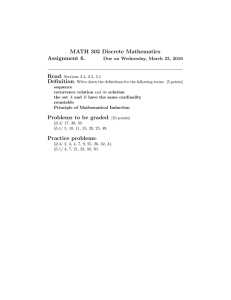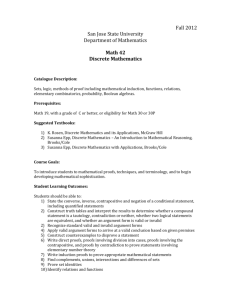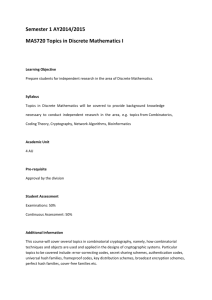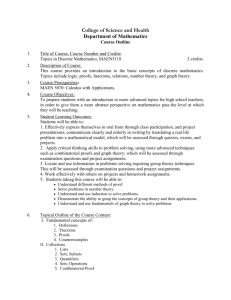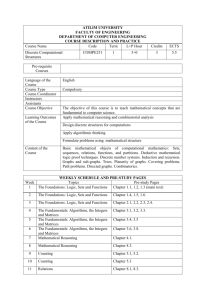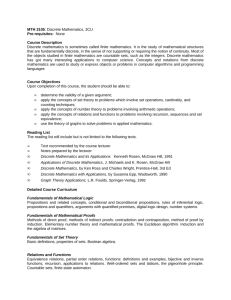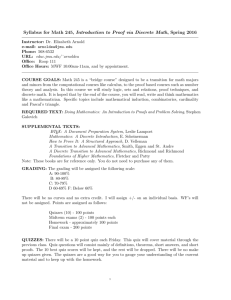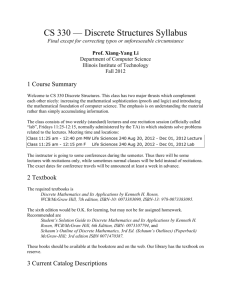MATH-UA.120: Discrete Mathematics Course Syllabus
advertisement
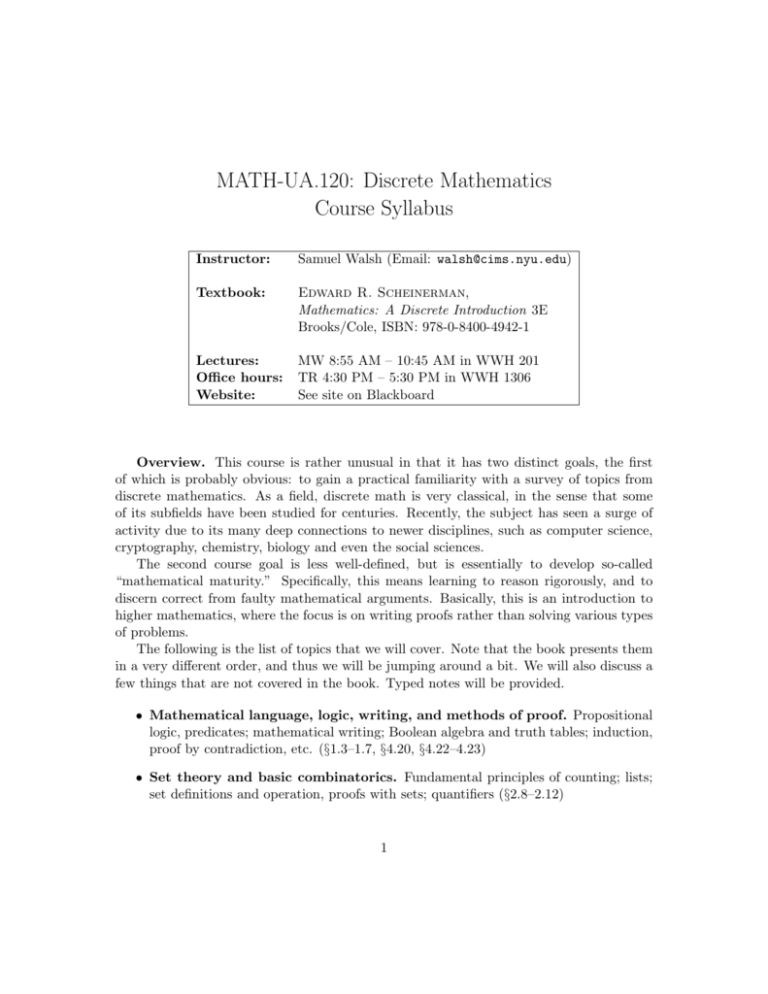
MATH-UA.120: Discrete Mathematics Course Syllabus Instructor: Samuel Walsh (Email: walsh@cims.nyu.edu) Textbook: Edward R. Scheinerman, Mathematics: A Discrete Introduction 3E Brooks/Cole, ISBN: 978-0-8400-4942-1 Lectures: Office hours: Website: MW 8:55 AM – 10:45 AM in WWH 201 TR 4:30 PM – 5:30 PM in WWH 1306 See site on Blackboard Overview. This course is rather unusual in that it has two distinct goals, the first of which is probably obvious: to gain a practical familiarity with a survey of topics from discrete mathematics. As a field, discrete math is very classical, in the sense that some of its subfields have been studied for centuries. Recently, the subject has seen a surge of activity due to its many deep connections to newer disciplines, such as computer science, cryptography, chemistry, biology and even the social sciences. The second course goal is less well-defined, but is essentially to develop so-called “mathematical maturity.” Specifically, this means learning to reason rigorously, and to discern correct from faulty mathematical arguments. Basically, this is an introduction to higher mathematics, where the focus is on writing proofs rather than solving various types of problems. The following is the list of topics that we will cover. Note that the book presents them in a very different order, and thus we will be jumping around a bit. We will also discuss a few things that are not covered in the book. Typed notes will be provided. • Mathematical language, logic, writing, and methods of proof. Propositional logic, predicates; mathematical writing; Boolean algebra and truth tables; induction, proof by contradiction, etc. (§1.3–1.7, §4.20, §4.22–4.23) • Set theory and basic combinatorics. Fundamental principles of counting; lists; set definitions and operation, proofs with sets; quantifiers (§2.8–2.12) 1 • Counting and relations. Equivalence classes, partitions; combinatorial properties: binomial coefficients, inclusion exclusion, etc. (§3.14–3.19) • Functions. Functions as mappings; properties of functions; the pigeonhole principle, cardinality; (§5.24–5.26) • Discrete probability. Events, conditional probability, random variables, expected value (§6) • Number theory. Divisibility, modular arithmetic, Chinese Remainder Theorem, Fundamental Theorem of Arithmetic (§7) • Graph theory. Basic definitions, circuits, trees, weighted graphs, isomorphism of graphs, planarity (§7.47–7.51, §7.53) Office hours. There will be two office hours held every week in WWH 1306. This is a time when I am guaranteed to be in my office and ready to answer questions about the course. Please do not hesitate to make use of it. You can also email me to set up an appointment if you have an unavoidable scheduling conflict. Homework. The majority of your learning will come through completing the homework assignments. These will be assigned weekly and collected Wednesday at the beginning of class. You are encouraged to work together, but each student must write up his or her own; do not simply copy one another. Also, please remember that the grader has to be able to follow your thought process in order to award credit. It is incumbent on you to ensure that your assignments are readable, both in terms of legibility and intelligibility. Given the size of the course, and the speed at which we’re going to be moving, late homework will not be accepted. Exams. There will be two midterm exams as well as a cumulative final: Midterm I: Midterm II: Final: Wednesday, October 3rd Wednesday, November 14th Monday, December 12th, 8:00 AM–9:50 AM. The exam dates are set in stone. There will be no makeups without a serious excuse (e.g., medical emergency), so plan accordingly. Grading. Your final grade will be determined according to the following formula. Homework: 20%; Midterms I& II: 40% (20% each); Final: 40%. 2
